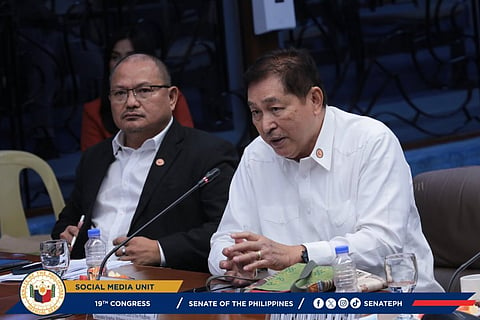
- NEWS
- the EDIT
- COMMENTARY
- BUSINESS
- LIFE
- SHOW
- ACTION
- GLOBAL GOALS
- SNAPS
- DYARYO TIRADA
- MORE

While the majority of the framers of the 1987 Constitution are opposed to Charter change, former Supreme Court Associate Justice Adolfo Azcuna is inclined toward the contrary, saying he himself, initiated the move some time ago to relax its restrictive economic provisions.
On the second day of the Committee of the Whole proceedings on Tuesday on Resolution of Both Houses 7, seeking to alter Articles 12, 14, and 16, Aczuna, one of the framers of the Constitution, stressed the need for amending the Constitution “so that it will be responsive to the fast-changing economic condition of the day.”
Aczuna was the vice chairman of the legislative committee of the constitutional commission that drafted the Constitution in 1986.
He underscored that despite the persistent attempts for Cha-cha, the 1987 Constitution--the “longest-running” in history--remains unamended to date because of the “ambiguous” nature of Article 17, or the provision on how to amend or revise the Constitution.
“The ambiguous nature of the provision proceeds from the fact that originally when we were adopting the present Constitution, the committee on legislative power adopted a unicameral form of legislature to be called national assembly,” Aczuna said.
“But when it was presented to the plenary, the plenary voted by difference of one vote to have a bicameral legislative body.”
Aczuna posits this ambiguity is “one of the reasons” why until now there has been no change in the Constitution.
“Some five years ago, I thought of a way of changing the economic provisions or more particularly restrictive portions of the economic provisions of the Constitution. I consulted business leaders,” he told the panel.
Azcuna then expressed support for the lower chamber’s RBH 7 to revamp Articles 12, 14, and 16, claiming it would be a great step forward in lifting the economic restrictions on public utilities, education, and advertisement.
The Joint Foreign Chambers of Commerce in the Philippines on Tuesday backed the proposal to eliminate the economic restrictions of the Constitution said to be hindering foreign capital into the country.
The business organization asserts that easing restrictions on foreign direct investment will facilitate greater inflow of foreign capital in the country, a laggard in Southeast Asia where global FDI has been steadily increasing.
"We are of the opinion that the removal of economic restrictions would facilitate increased FDI in sectors where such investment is restricted," the JFCCP said in a letter to Speaker Martin Romualdez's office.
The House chief on Monday said they will adopt all three proposed amendments of the Senate's Resolution of Both Houses 6 "in toto" to dispel doubts that the efforts of the lower chamber for Cha-cha are politically motivated.
